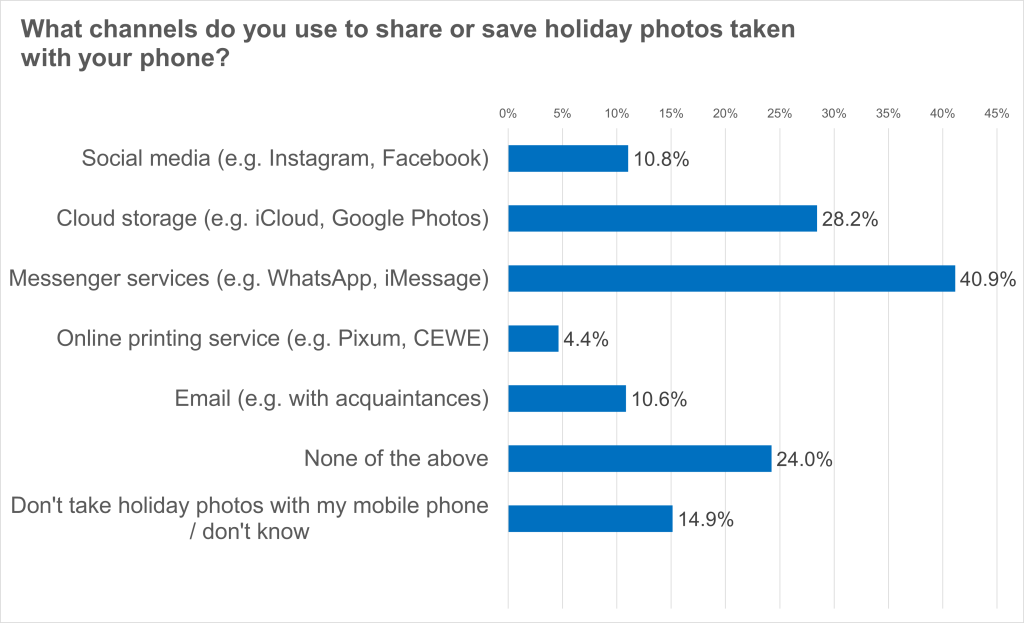- 40.9 percent of Germans share mobile phone holiday pictures via messenger services such as WhatsApp
- 10.8 percent share them on social media channels such as Instagram
- Parents should make children’s faces unrecognisable
Whether from a day at the beach or a trip to the mountains: 40.9 percent of Germans share holiday photos and videos via WhatsApp, iMessage or other messenger services. Approximately one in ten (10.8 per cent) post photos via social media channels such as Instagram or Facebook. Additionally, 10.6 per cent send photos via email and 4.4 per cent have photos printed online via print services. These are the findings of a representative survey conducted by the opinion research institute Civey on behalf of eco – Association of the Internet Industry, involving 2,500 Germans over the age of 18.
However, Alexandra Koch-Skiba, Head of the eco Complaints Office, advises that you should check the content of pictures before sharing them, especially if there are children in the pictures. “It is completely understandable that parents like to capture special moments on holiday, take photos of their children, and then share them with others,” says Koch-Skiba. “But what truly matters is the content of the pictures and with whom or on which platforms they are shared.”
The eco Head of Complaints Office gives 5 tips:
- Do not share pictures in bikinis, swimwear or with too much naked skin.
As a general rule, the advocates recommend refraining from sharing photos in which children and young people are naked or lightly clothed. “While parents naturally would like to capture moments like trips to the seaside or the swimming pool, extra caution is essential when it comes to sharing such photos,” adds Koch-Skiba. She warns that family photos can fall into the wrong hands and become sexualised: “Even though many parents are already aware of this issue, there is still a significant need for education,” according to Koch-Skiba. The fact that the hashtag #kidsbeachwear on the picture platform Instagram, for example, contains more than 30,000 posts, speaks volumes. “It should always be considered that recipients might take screenshots of postings or a status, which could then be further circulated without the parents even knowing about it,” explains Koch-Skiba. - Make the faces of children and young people unrecognisable
But even seemingly harmless photos should not be shared carelessly. In the fight against sexualised violence online, Koch-Skiba and her team also come across supposedly harmless pictures of children. “Even photos taken while visiting sights, at the playground or at a child’s birthday party can sometimes end up in paedophile forums if shared and posted carelessly and taken out of context,” warns Koch-Skiba. “Although this may not be the norm, parents should be aware of the potential risks. Anyone who covers their children’s faces with a smiley, pixelates them, or simply takes photographs of the back of their heads is definitely taking a safer approach.” At the same time, the children’s personal rights can be respected. - Respect children’s rights
If possible, parents should involve their children in deciding with whom they want to share their photos. “Of course, this is more suitable when the children are a little older,” says Koch-Skiba. “However, introducing your children to this topic at an early age also lays the foundation for their responsible social media use during their teenage years.” With regular workshops at schools and parents’ evenings, prevention is also part of the eco Complaints Office’s remit. - Check security settings
Koch-Skiba also recommends sharing photos only with selected individuals, such as relatives or close friends. To achieve this, popular messenger services and social media platforms provide comprehensive security settings that go beyond the simple choice of a private or public account. “Unfortunately, the Internet can only serve as a limited digital family album,” says Koch-Skiba. “For instance, if I wish to share holiday pictures on my status – temporarily and for up to 24 hours – I now have the option to decide for each individual contact whether the photos should be visible to them or not.” - Report inappropriate photos
If you have subsequent doubts about whether posting certain holiday photos was a good idea, Koch-Skiba advises deleting your own postings. This can at least minimise risks. “That’s why it’s essential to have regular conversations with children and young people about handling messenger and social media services, especially when adolescents share photos and videos on their mobile phones and accounts. If users come across inappropriate photos of children and young people, they can also report them to the eco Complaints Office.
Download graphic





